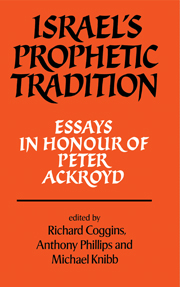Book contents
- Frontmatter
- Contents
- Preface
- Biographical note
- Abbreviations
- Note
- Prophecy in the ancient Near East
- The origins of prophecy in Israel
- Three classical prophets: Amos, Hosea and Micah
- The Isaiah tradition
- An alternative prophetic tradition?
- Visionary experience in Jeremiah
- The Ezekiel tradition: prophecy in a time of crisis
- The prophets of the restoration
- Prophecy and the emergence of the Jewish apocalypses
- Prophecy and wisdom
- Prophecy and the cult
- Prophecy and law
- A change of emphasis in the study of the prophets
- Martin Buber and the interpretation of the prophets
- Index of Biblical References
Visionary experience in Jeremiah
Published online by Cambridge University Press: 09 January 2010
- Frontmatter
- Contents
- Preface
- Biographical note
- Abbreviations
- Note
- Prophecy in the ancient Near East
- The origins of prophecy in Israel
- Three classical prophets: Amos, Hosea and Micah
- The Isaiah tradition
- An alternative prophetic tradition?
- Visionary experience in Jeremiah
- The Ezekiel tradition: prophecy in a time of crisis
- The prophets of the restoration
- Prophecy and the emergence of the Jewish apocalypses
- Prophecy and wisdom
- Prophecy and the cult
- Prophecy and law
- A change of emphasis in the study of the prophets
- Martin Buber and the interpretation of the prophets
- Index of Biblical References
Summary
To appreciate Jeremiah's prophetic experience it is essential to keep in mind the auditory element that is a particularly important feature of his prophecies. This is to be found not only in the introductory formulae of the passages shaped according to a Deuteronomistic understanding (Mowinckel's Source c, differently presented by Thiel, 1973; cf. also Wildberger, 1942): 7: 1; 11: 1; 18: 1; etc. In addition, the account of Jeremiah's call and the collection of Jeremiah's own early oracles (chs. 2–6) stand under the rubric of a personally shaped formula for the coming of God's word (Wortereignisformel) (1:4; 2:1). (On this formula cf. Zimmerli, 1979d, pp. 144–5; on its occurrence in Jeremiah cf. Neumann, 1973; Seidl, 1979.)
In a similar way, the coming of God's word is also significant in the narrative sections of the book (Mowinckel's Source B, differently presented by Wanke, 1971). Here it is stressed that the word of Yahweh to Jeremiah did not always come immediately. Chs. 28 and 42 tell how the prophet was in acutely oppressive situations in which he had to speak directly and yet wait in obedience for the word of God. According to ch. 28 his message that Judah would have to bear the yoke of the king of Babylon appeared to be negated by the contrary preaching by Hananiah of an apparently certain message supported by an impressive act of symbolism. He left the scene in silence (28: Hi), but later as a result of the reception of a new word, he announced to Hananiah God's message that his death was imminent as divine judgement for his disobedient preaching.
- Type
- Chapter
- Information
- Israel's Prophetic TraditionEssays in Honour of Peter R. Ackroyd, pp. 95 - 118Publisher: Cambridge University PressPrint publication year: 1982



